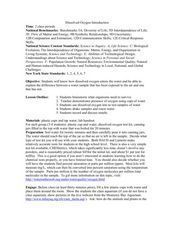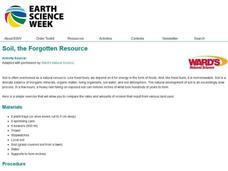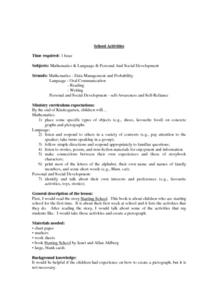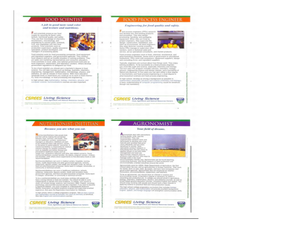Curated OER
Food Web
Learners are able to define food web, and identify the interdependence of organisms within a system. They are able to describe how natural events and human activities can impact a food web.
Curated OER
Dissolved Oxygen Introduction
High schoolers are shown how dissolved oxygen enters the water. They are taught the difference between a water sample that has been exposed to the air and one that has not. Students brainstorm what organisms need to survive. They use...
Captain Planet Foundation
Sorting Out Soils
Sift through soil and learn about why it's important for organic processes. After discussing what makes up soil, such as the living organisms and what types of soil have more nutrients, kids sample layers of mulch and deeper soil to...
Curated OER
Using Details from the Text
Explore non-fiction comprehension strategies with your class. They will visualize daily activities and label a 4 circle Venn diagram with related phrases. They must identify the overlapping sections as "main ideas," then complete a...
Consortium for Ocean Science Exploration and Engagement (COSEE)
Understanding the Food Web
Building on prior knowledge of the pervious lesson in the series, pupils explain the previous lesson to each other. Then they write a simple guide for a young child to read on the same topic.
Curated OER
Forest Food Chains and Webs
Students explore forest ecological systems. In this ecology lesson, students classify forest plants and animals according to their ecological roles. Students play a related vocabulary guessing game. Students choose a card on which...
NNF
Floods Happen
Did you know that flooding is the most common natural disaster in the United States? Prepare your learners with the facts about floods and offer them the proper knowledge and tools for dealing with this type of emergency.
Curated OER
Fungus Among Us- Non-Fiction Reading Comprehension Worksheet
In this fungus non-fiction reading comprehension learning exercise, learners read a 3 page selection that describes the characteristics and life of fungi. They answer 10 questions based on the reading which include true or false,...
Curated OER
Beautiful Birds: Non-Fiction Reading Comprehension Worksheet
In this birds reading comprehension worksheet, students read a short non-fiction selections about the characteristics of birds. They answer 10 questions based on the reading which include true or false, short answer, and multiple choice.
Curated OER
Classify the Microbes
Learners classify microorganisms into categories based on their characteristics. Pupils use a taxonomic key to identify organisms. They classify certain bacteria, protists, and viruses using a classification or taxonmic key.
Curated OER
Soil, the Forgotten Resource
Learners discuss soil understanding that is is often overlooked as a natural resource. In this science lesson plan, students recognize that we depend on it for energy in the form of foods. Learners experiment with six boxes of soil to...
K12 Reader
Ecosystems
Examine how living and non-living things work together in a reading passage about ecosystems. Class members read the text and then respond to five response questions that relate specifically to the content of the passage.
Casimir Middle School
Biological Classification Worksheet
Classify living things with a set of worksheets that has pupils sorting and indentifying living and non-living things. Learners use the worksheets as a basis for finding their answers.
Curated OER
School Activities
First graders place some specific types of objects (e.g., shoes, favorite food) on concrete graphs and pictographs. They listen and respond to others in a variety of contexts (e.g., pay attention to the speaker; take turns speaking in a...
Curated OER
Michigan Food: From Farm to You
Learners recognize Michigan on a map and understand how its climate is affected by the Great Lakes. In this Michigan food lesson, students play a trivia game to identify the produce of Michigan. Learners relate the climate in each part...
Curated OER
Six Levels of Ecological Organization
Ninth graders describe the six levels of ecological organizations and give examples of each. They also differentiate between food chains and webs and identify trophic and consumer levels in food chain and food webs.
NOAA
Build Your Own Ocean Ecosystem
Hold the sea in the palm of your hand! Amateur oceanographers work together to create models of an ocean ecosystem in the sixth and final installment in a series. Raise awareness of global ocean health issues through guided research,...
Curated OER
Open Inquiry Using C. elegans
Ever wondered what motivates a roundworm? Introduce your biology class to C. elegans, a non-parasitic model organism that can help them understand behavioral stimuli. Paired pupils design an experiment to test the worm's reaction to...
Curated OER
Habitat survival
Sixth graders study different environments and how the food chain affects the survival of different animals. In this environments lesson plan, 6th graders share the visuals which describe the characteristics of the environment that they...
Curated OER
Vocabulary: Kansas Prairies
Students explore the ecosystem by reviewing scientific vocabulary terms. In this environmental awareness lesson, students identify the differences between abiotic and biotic factors and their relationship to the Earth. Students define...
Curated OER
Breakfast for Champions
Students prepare an event to honor philanthropic activities in their community. In this common good lesson plan, students send out invitations to local non-profits or to those who engage in philanthropic activities and plan an awards...
Curated OER
Service Learning Project
Students plan a service project to contribute to their community and then reflect on their experience. In this service project activity, students help in a food pantry or donation center in their community. Students then write statements...
Curated OER
Environment
Students examine how connected they are to the environment and how organisms are affected by other organisms. They also discover that the environment is affected by human interactions.
Curated OER
Worming Your Way Through the Soil
Students study soil, living and non-living particles in the soil, and learn about composting. In this soil study lesson, students study soil samples and discuss the living and non-living components of the soil. Students classify the...























